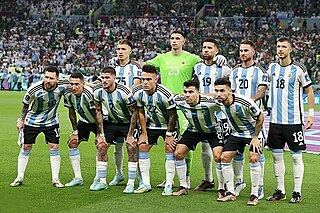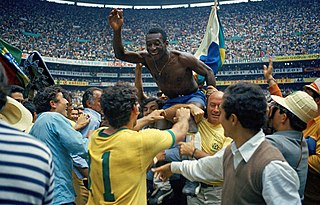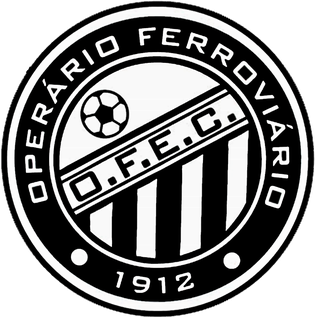Related Research Articles

The FIFA World Cup, often called the World Cup, is an international association football competition among the senior men's national teams of the members of the Fédération Internationale de Football Association (FIFA), the sport's global governing body. The tournament has been held every four years since the inaugural tournament in 1930, with the exception of 1942 and 1946 due to the Second World War. The reigning champions are Argentina, who won their third title at the 2022 tournament.

The 1938 FIFA World Cup was the 3rd edition of the World Cup, the quadrennial international football championship for senior men's national teams. It was held in France from 4 to 19 June 1938. Italy defended its title in the final, beating Hungary 4–2. Italy's 1934 and 1938 teams hold the distinction of being the only men's national team to win the World Cup multiple times under the same coach, Vittorio Pozzo. It would be the last World Cup until 1950; the 1942 and 1946 World Cups were cancelled due to World War II.

The 1950 FIFA World Cup was the 4th edition of the FIFA World Cup, the quadrennial international football championship for senior men's national teams. it was held in Brazil from 24 June to 16 July 1950. It was the first World Cup tournament in over twelve years, as the 1942 and 1946 World Cups were cancelled due to World War II. Italy, the two-time defending champions, were eliminated in the first round for the first time in history. Uruguay, who had won the inaugural competition in 1930, defeated the host nation, Brazil, in the deciding match of the four-team group of the final round. This was the only tournament not decided by a one-match final. It was also the inaugural tournament where the trophy was referred to as the Jules Rimet Cup, to mark the 25th anniversary of Jules Rimet's presidency of FIFA.

The Hungary national football team represents Hungary in men's international football, and is controlled by the Hungarian Football Federation. The team has made nine appearances in the FIFA World Cup, and five in the UEFA European Championship. Hungary plays their home matches at the Puskás Aréna, in Budapest, which opened in November 2019.

The Switzerland national football team represents Switzerland in men's international football. The national team is controlled by the Swiss Football Association.

The Asian Football Confederation (AFC) is the governing body of association football, beach soccer, and futsal in most countries and territories in Asia. The AFC was formed in 1954. It has 47 members. The Asian Ladies Football Confederation (ALFC) was the section of AFC that managed women's association football in Asia. The group was independently founded in April 1968 in a meeting involving Taiwan, British Hong Kong, Malaysia and Singapore. In 1986, ALFC merged with AFC.

Leônidas da Silva was a Brazilian professional footballer who played as a forward. He is regarded as one of the most important players of the first half of the 20th century. At the height of his career, Leônidas da Silva was very popular amongst the people of Brazil and Rio de Janeiro. Leônidas played for Brazil national team in the 1934 and 1938 World Cups, and was the top scorer of the latter tournament. He was known as the "Black Diamond" and the "Rubber Man" due to his agility.
A total of 37 teams entered the 1938 FIFA World Cup qualification rounds, competing for a total of 16 spots in the final tournament. For the first time the title holders and the host country were given automatic qualification. Therefore, France, as the hosts, and Italy, as the defending champions, qualified automatically, leaving 14 spots open for competition.
The FIFA World Cup qualification is a set of competitive matches that a national association football team plays in order to qualify for one of the available berths at the final tournament of the men's FIFA World Cup.

Stade Chaban-Delmas is a sporting stadium located in the city of Bordeaux, France. It was the home ground of FC Girondins de Bordeaux. Since 2011, it has also hosted matches of Top 14 rugby team Union Bordeaux Bègles.

Géza Toldi was a Hungarian footballer who played as a forward. He played for Ferencvárosi TC, and from 1934 to 1938 for the Hungarian national team, serving as captain in 1936. He scored a goal in the 1938 FIFA World Cup.
Edmond Delfour was a French international footballer who played as a midfielder. He played at the 1930, the 1934 and the 1938 FIFA World Cups. Even when he was still a player, he started his coaching career that spanned three decades.

Pietro Rava was an Italian football defender and coach, who played as a full-back. He won the 1936 Summer Olympics and the 1938 FIFA World Cup with the Italy national team.

This article summarizes the results and overall performance of Brazil at the FIFA World Cup, including the qualification phase and the final phase, officially called the World Cup finals. The qualification phase, which currently takes place over the three years preceding the finals, is used to determine which teams qualify for the finals. The current format of the finals involves 32 teams competing for the title, at venues within the host nation over a period of about a month. The World Cup Final is the most widely viewed sporting event in the world, with an estimated over 1 billion people watching the 2014 tournament final.

The 1938 FIFA World Cup final was the third edition of the football quadrennial tournament match contested by the men's national teams of FIFA to determine the 1938 FIFA World Cup champions: Italy and Hungary. Italy defended its claim to the championship 4–2 in the last tournament before World War II.
Josef "Pepi" Stroh was an Austrian footballer and football manager. He played club football mainly with FK Austria Wien.

Operário Ferroviário Esporte Clube, more commonly referred to as Operário Ferroviário, Operário de Ponta Grossa or simply Operário-PR, is a Brazilian professional association football club in Ponta Grossa, Paraná which currently plays in Série B, the second tier of Brazilian football, as well as in the Campeonato Paranaense, the top division of the Paraná state football league.
This page details the match results and statistics of the Dutch East Indies national football team.

Erik "Lillis" Persson was a Swedish football forward who played for AIK. He also played for Team Sweden at the 1936 Summer Olympics, and at the 1938 FIFA World Cup in France.

Ümraniyespor Kulübü is a Turkish professional football club located in Ümraniye, Istanbul.
